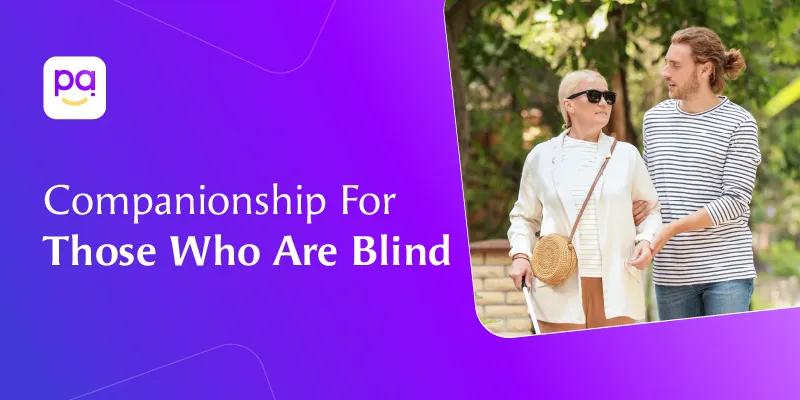Companionship for Those Who Are Blind
In This Article
Companionship for Those Who Are Blind
Pragati
Updated on September 28, 2024
Medically verified by
Fact checked by

For You
5 min read
Despite such challenges, blind people show an excellent deal of achievements which can be possibly made by them. All this can happen because of companionship, community support, assistive technologies, and dedication.
Therefore, having Pa companions for the individuals who are blind or visually impaired, companionship plays an important role in improving their quality of life.
You will further get to know about the various aspects of companionship for those who are blind, including the benefits, challenges, and effective strategies for fostering meaningful relationships.
The Importance of Pa Companionship
Pa Companionship is important for emotional, mental health, and as well as for physical well-being. For people who are blind or visually impaired, Pa companionship helps to decrease the feelings of isolation and loneliness and sadness they may feel due to plenty of reasons.
There is one research by Ana Kurtović topic predictors of depression and life satisfaction in visually impaired people, published in 2017 where it has been shown that if visually impaired individuals get social support they somehow somewhere improves life satisfaction and reduces depression, enhancing overall mood.
Benefits of Pa Companionship for Blind Individuals
1. Emotional Support
Pa The emotional support we Pa companionship offers helps the visually impaired people deal with the difficulties. The compassion, awareness, and support that friends and family provide can boost resilience and self-worth.
2. Practical Assistance:
By having a Pa companion the blind will get assistance in their daily duties like buying food, directions, and transportation. For them, this useful assistance can boost independence and lessen stress.
3. Social Inclusion
Pa companions encourage the blind to do activities they like which promotes the social acceptance for the blinds.
4. Mental Health
Pa companionship helps in maintaining the relationships that have its own kind of beneficial effect on mental health. Thus, Strong social ties lower the incidence of anxiety and depression and enhance mental well-being overall.
 5 min read
5 min readCompanionship for Those with Mobility Issues
 5 min read
5 min readHow Pa Companionship will help the NRI community
 6 min read
6 min readHow Companionship will Help Working Professionals in Bangalore
Get a Callback Now
Challenges in Finding Companionship
For those who are blind, finding and keeping a companion beside them can be difficult, despite the advantages. Here, the Pa is trustworthy and easily accessible to find.
Among the challenges are a few of them:
1. Social Stigma: Stereotypes and misconceptions regarding blindness can result in discrimination and social isolation. It may be challenging for blind people to set up and upkeep connections as a result of these obstacles.
2. Communication Barriers: Building connections requires effective communication. Social relationships may be affected for blind people by difficulties with nonverbal communication, such as understanding body language and facial expressions.
3. Mobility Issues: Limited mobility can make it more difficult to meet new people and limit your access to social opportunities. This problem is made worse by difficult transportation and unsuitable surroundings.
4. Dependence on Assistive Technology: Assistance devices can increase the chances of becoming self-sufficient, but they can also get in the way of unplanned social events. For example, using Braille displays or screen readers exclusively may prevent people from participating in real-time conversations.
Strategies by Pa Companionship
Multiple strategies can be utilized to get over these obstacles and promote social interaction among the visually impaired:
1. Community Programs and Supporting companionship
Pa companion helps the visually impaired people to get involved in community efforts and helping groups that offer the chances for making bonds with others to make friends and enhance social interaction. These environments provide a secure and compassionate setting for forming good bonded relationships with others.
2. Advocacy and Awareness
Pa team members and their companions help to increase the general public's knowledge and awareness of blindness which can help to lessen the discrimination and promote welcoming behaviors for them. Social situations that are more welcoming and encouraging can result from campaigns for change.
3. Assistance and communication
Pa companions give assistance to blind people in their social skills and communication which enhances their capacity as well as make them capable for productive interaction. Furthermore, Pa companions always try to improve mutual understanding and cooperation which somehow achieved by sharing thoughts.
4. Assisting in Technology:
Pa companion helps to make them feel included in virtual communities and offer a platform for friendship-building and experience-sharing.
Conclusion
It is essential for the wellbeing of blind people to have companionship. Even though it might be difficult to establish and sustain relationships, there are a number of techniques that can be used to improve and have companionship. Therefore, Pa is here with them in their lows and highs which is easily accessible to have without any fear.
Pa guarantees that blind people have happy and meaningful social relationships by raising awareness, helping them to make the use of technology, and establishing supporting environments.
Pa companionship significantly reduces feelings of isolation and depression, enhancing overall mood and life satisfactions.
Pa companionship significantly reduces feelings of isolation and depression, enhancing overall mood and life satisfactions.
Pa also encourages the blind to participate in community activities fosters social acceptance and inclusion.
Pa companions help the blind to make them grow with effective communication and social skills to improve interactions and mutual understanding.
Pa companions use strategies such as advocacy, awareness, and the use of technology to help mitigate challenges like social stigma and mobility issues.
Pa companions encourage the visually impaired people to participate in shared activities like sports and arts to strengthen social bonds and friendships.

